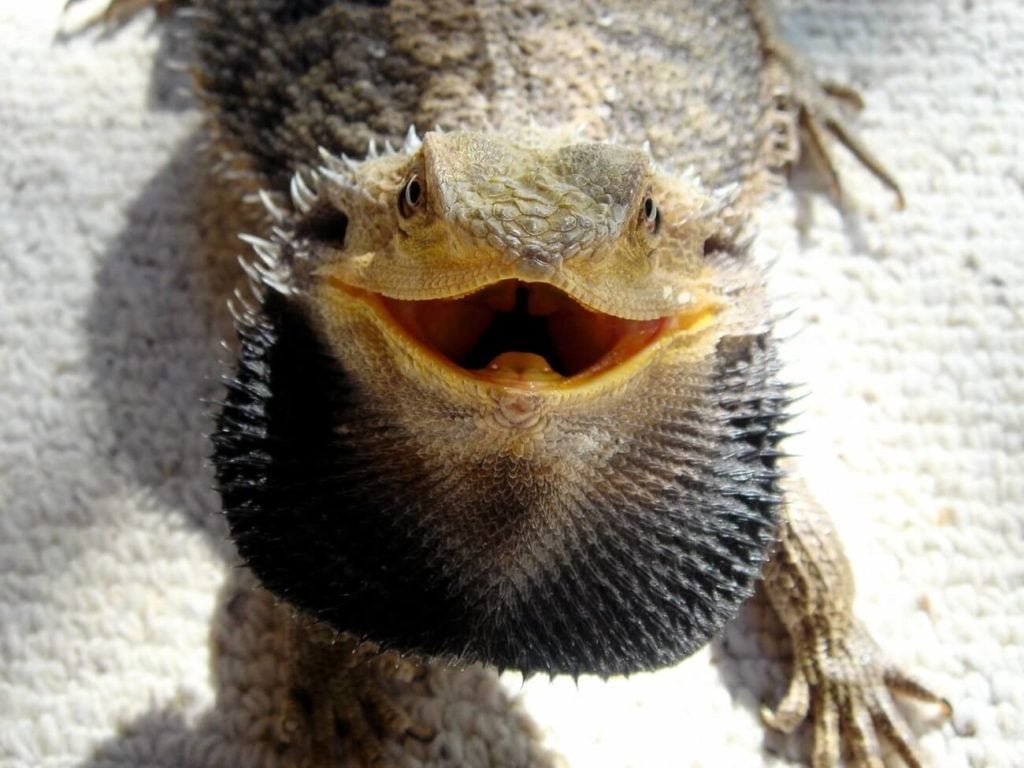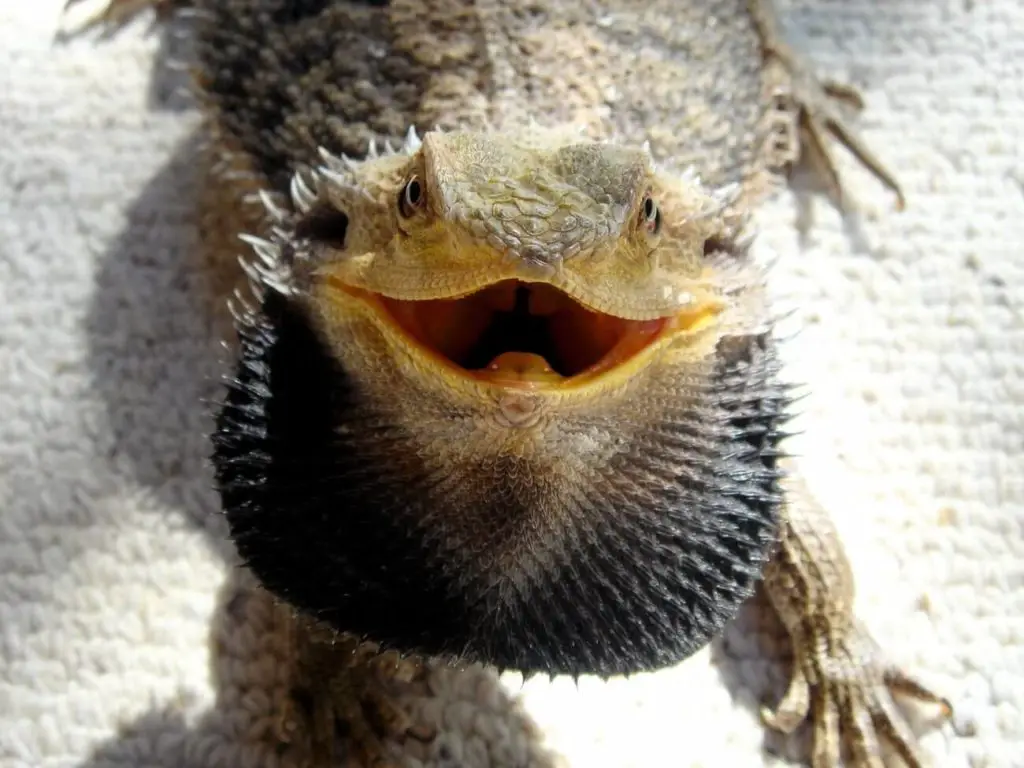Bearded dragons are fascinating creatures that are known for their unique physical features and peculiar behaviors. One of the most striking features of a bearded dragon is its neck, which can sometimes appear to be black in color. This can raise concerns for pet owners who may wonder if it is a sign of illness or distress.
However, there are several reasons why a bearded dragon’s neck may turn black, ranging from natural physiological changes to environmental factors. In this article, we will explore the various causes of blackening necks in bearded dragons and what pet owners can do to ensure their beloved pets remain healthy and happy.
Bearded dragons can turn their necks black due to stress, aggression, or dominance displays. However, a black beard can also indicate illness or injury. If your bearded dragon’s neck remains black for an extended period or is accompanied by other symptoms like lethargy or lack of appetite, consult a veterinarian.

Why is My Bearded Dragon’s Neck Black?
If you’re a bearded dragon owner, you may have noticed that your pet’s neck is black. This can be a bit concerning, especially if you’re unsure of why this is happening. However, there’s no need to worry, as this is a natural occurrence in bearded dragons. In this article, we’ll explore why your bearded dragon’s neck may be turning black.
Reasons for Black Bearded Dragon Neck
Bearded dragons are known for their unique appearance, and their black neck is one of their distinguishing features. There are several reasons why your bearded dragon’s neck may be turning black.
First, it could be a sign of dominance. Bearded dragons are territorial animals, and when they feel threatened or want to assert their dominance, they may puff out their beard and turn their neck black. This is a warning to other bearded dragons to stay away.
Secondly, it could be a sign of stress. If your bearded dragon is feeling stressed or anxious, they may also turn their neck black. This could be due to a change in their environment, such as a new cage or a change in their diet.
Health Concerns with a Black Bearded Dragon Neck
While a black neck is a natural occurrence in bearded dragons, it’s important to monitor your pet’s health to ensure that there are no underlying health concerns. A black neck could be a sign of dehydration, which is a common issue in bearded dragons.
Dehydration can be caused by a lack of access to water or not enough humidity in their environment. It’s important to ensure that your bearded dragon has access to fresh water at all times and that their cage is properly humidified.
Another health concern that could be causing a black neck is a respiratory infection. If your bearded dragon is having trouble breathing or is exhibiting other signs of illness, such as lethargy or loss of appetite, it’s important to take them to a veterinarian for treatment.
Preventing Black Bearded Dragon Neck
While a black neck is a natural occurrence in bearded dragons, there are steps you can take to prevent it from happening too frequently.
Firstly, ensure that your bearded dragon’s environment is comfortable and stress-free. This includes providing them with a properly sized cage, a healthy diet, and a comfortable temperature and humidity level.
Secondly, make sure that your bearded dragon has access to fresh water at all times. This will help prevent dehydration, which can cause a black neck.
Benefits of a Black Bearded Dragon Neck
While a black neck may seem concerning, it’s actually a sign that your bearded dragon is healthy and happy. It’s a natural occurrence in bearded dragons, and it’s a way for them to assert their dominance and communicate with other bearded dragons.
Additionally, a black neck can be a beautiful and unique feature of your bearded dragon. It’s one of the many things that make these animals so fascinating to own and care for.
Conclusion
In conclusion, a black neck is a natural occurrence in bearded dragons. While it can be concerning, it’s important to monitor your pet’s health to ensure that there are no underlying health concerns. By providing your bearded dragon with a comfortable and stress-free environment, access to fresh water, and a healthy diet, you can help prevent a black neck from occurring too frequently.
Frequently Asked Questions
Bearded dragons are one of the most popular reptiles kept as pets. They are docile and friendly, making them a great companion for reptile lovers. However, sometimes owners may notice that their bearded dragon’s neck has turned black. This discoloration can be a cause for concern. In this article, we will answer the five most frequently asked questions about why a bearded dragon’s neck may turn black.
Why is my bearded dragon’s neck black?
The most common reason for a bearded dragon’s neck turning black is that it is in a state of discomfort. This discomfort could be due to many reasons, such as being too hot or too cold, being stressed, or being ill. In most cases, the black color is a sign that your bearded dragon is trying to regulate its body temperature.
If your bearded dragon’s neck is black, it is crucial to check the temperature of its basking spot. The basking spot should be approximately 100-110 degrees Fahrenheit. If your bearded dragon’s basking spot is too cold, it may try to regulate its body temperature by turning its neck black. If the basking spot is too hot, your bearded dragon may also turn its neck black, indicating that it is trying to cool down.
Can a bearded dragon’s black neck be a sign of illness?
Yes, a bearded dragon’s black neck can be a sign of illness. If your bearded dragon’s neck is consistently black, and it is not related to temperature regulation, it is crucial to take it to a veterinarian. A black neck could be a sign of a respiratory infection, parasites, or other underlying health issues.
It is essential to monitor your bearded dragon’s behavior and look for other signs of illness, such as lethargy, loss of appetite, or difficulty breathing. If you notice any of these symptoms, take your bearded dragon to the vet immediately.
Can stress cause a bearded dragon’s neck to turn black?
Yes, stress can cause a bearded dragon’s neck to turn black. Bearded dragons are sensitive creatures, and any changes in their environment can cause stress. Moving to a new home, changing their diet, or introducing new pets can all cause stress in bearded dragons.
If your bearded dragon’s neck is consistently black, and you have ruled out temperature regulation as the cause, it is essential to evaluate its environment for potential sources of stress. Try to make changes to reduce stress, such as providing a consistent routine, hiding spots, and a comfortable temperature.
How can I prevent my bearded dragon’s neck from turning black?
The best way to prevent your bearded dragon’s neck from turning black is to provide a comfortable environment. Ensure that the temperature in the vivarium is consistent and that the basking spot is at the right temperature. Bearded dragons also need a varied diet that includes protein, fruits, and vegetables.
It is also essential to provide plenty of hides and climbing opportunities to reduce stress. A comfortable and enriched environment will help to keep your bearded dragon healthy and happy.
When should I take my bearded dragon to the vet for a black neck?
If your bearded dragon’s neck is consistently black, and it is not related to temperature regulation, it is crucial to take it to a veterinarian. A black neck could be a sign of an underlying health issue that requires medical attention.
It is also essential to monitor your bearded dragon’s behavior for other signs of illness, such as lethargy, loss of appetite, or difficulty breathing. If you notice any of these symptoms, take your bearded dragon to the vet immediately. Early intervention can help to prevent more severe health issues from developing.
Reasons Why Your Bearded Dragon’s Beard Is BLACK !!
In conclusion, if you notice that your bearded dragon’s neck is turning black, it is important to take action and investigate the cause. This discoloration can be a sign of stress, illness, or even a natural response to environmental changes.
To provide the best care for your pet, it is important to monitor their behavior and environment regularly. Be sure to provide a comfortable and stress-free environment for your bearded dragon, and seek the advice of a reptile veterinarian if you notice any concerning symptoms.
Remember, as a responsible pet owner, it is your duty to ensure the health and well-being of your bearded dragon, including monitoring any changes in their appearance or behavior. By being proactive and attentive, you can help your pet live a happy and healthy life.


